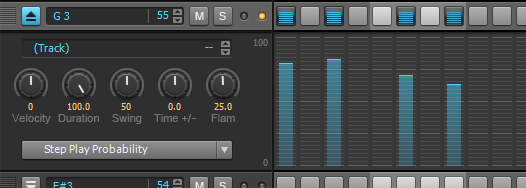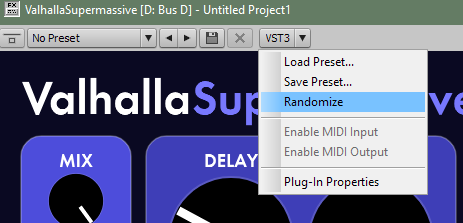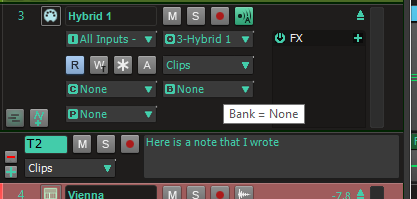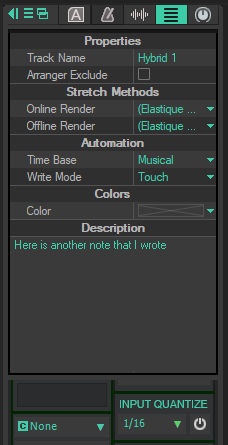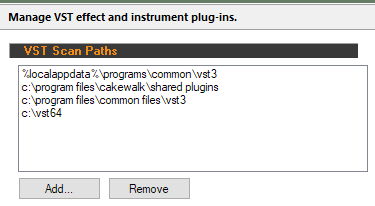-
Posts
8,670 -
Joined
-
Last visited
-
Days Won
30
Everything posted by Starship Krupa
-

Plugin Boutique May Freebie w/Purchase - Antares DUO
Starship Krupa replied to cclarry's topic in Deals
I kinda had the moment of clarity with this one. At first I was thinking "ooh, Antares," but as you say, it's a vocal doubler. I need that like I need another channel strip or LUFS meter. My go-to vocal doubler is Soundspot Voxbox. It just has the best display for indicating what it's doing. Most of my old Soundspot FX have been replaced in either Meldaproduction or Plugin Alliance sales (if they would use OpenGL for those pretty UI's it might be a different story), but that one has withstood the test o'time. I got Objeq Delay as a PB freeB a couple of years (?) back and it is alllll that. Good grab. Some really unique sounds in that thing. It lives up to A|A|S' reputation for sonic quality and delivering really useful presets. -
It's been noted by the dev team, IIRC, that some plug-ins have trouble understanding the concept of "idle" and sit there flailing away flipping the "dirty" bit so often that it triggers the auto save counter in less than a minute. So I can have an auto save set for 5 changes or 5 minutes (which I assume is "whichever comes first?") and certain plug-ins make Cakewalk think those changes happen about once every 5 seconds. That's how I understand it. I guess the "change" counter could be reconfigured to only count changes made by via user input, but of course, that would require the opening of ye olde code, with the possibility of encountering dragons within its maze of dusty passages.
-
In other words, Patricio, keep checking the Deals forum! You don't want to miss anything.☺
-
Yeah, the "performance enhancements" amounted to "allowing it to perform after installation." I dutifully downloaded the "updates" even though I never had the same issue that many were complaining about. The installed .DLL's were exactly the same size and date as the previous revisions.
-
I accept it as part of the joy of Cakewalk. If you want to be humbled some more (in a good way), head over to the Tutorials sub and check out some of the tips. I just posted one about a couple of the stochastic elements built into Cakewalk. The Step Sequencer can add randomization to how often a note will sound and the plug-in properties menu can randomize whatever parameters an effect or synth exposes. There's a lot more to the Step Sequencer than I had thought. I don't think it gets the attention it deserves. I want to try going to it first when I want to make a beat.
-
Well, do check out that thread. LISP by SleepyTimeDSP is pretty good. ToneBoosters has recently released Sibalance for free. Both of them surpass the legendary Fish Fillets, IMO. Go to libbyapp.com and check out the latest issue of Computer Music (for free) and you will get access to many dozens of pretty great FX and instruments, one of which is Unfiltered Audio's G8 CM, which is better than any other gate on the market, with the exception of Unfiltered Audio's full version. If you think Floorfish is great, G8 CM has everything you need and then some. They also have a version of Sibalance, which is now unnecessary since the ToneBoosters release. The Fish Fillets were great back when all was 32-bit and good freeware plug-ins were more rare, but trying to choose great freeware FX these days is like trying to drink from the proverbial firehose.
-
Well, technically, Windows doesn't support VST3 plug-ins (just as Microsoft doesn't officially recognize ASIO as a driver model), it's the other way around. But I did use VST3's for years, including with CbB, on Windows 7. Moreover, since Steinberg came out with the VST3 spec in 2008, even Windows 8 was still 4 years down the road, and Windows 10 was 7 years off. So yeah, VST3 better have supported Windows 7. I've found, though, that it's taken some manufacturers a while to get VST3 right. Acon Digital's excellent Multiply Chorus, a freeware stalwart for many years, was updated to include VST3 support, and it's just broken on Cakewalk in VST3 form. Same with a Hornet plug-in that came out just last year. So the dance is still "install VST3 first, if it has issues, try the VST2 instead." A wholesale failure for all VST3 instruments to work in Cakewalk is a big anomaly, but @Bad Mac hasn't said whether he's tried any of the ones I suggested. As far as I can tell, he's having trouble with one single instrument that others have also had trouble with. Until he checks back in, it's a mystery.
-
I know, but isn't it still possible for it to be deleted? I thought it was worth checking, as his issue seemed so odd in the first place.
-
I've played around with Stochas, a MIDI sequencer that lets you set each cell to have a certain probability of sounding when the playhead hits it. Kinda fun for certain weirdo stuff that I get into at times. You can also randomize velocity, I believe. I found out last night that Cakewalk's Step Sequencer already has variable note probability built in, when I did a search on the word "randomize." To access this feature, you click the arrow to the left of the note header, then from the menu, choose Step Play Probability. At that point, you can draw in the controller strip a probability that any given note will play: Neat, huh? At its most basic, it's good for making beats that change up just a little every so often. Adds variety. As a more "out there" application, you can do things like set the rows up to be a certain scale, fill all the cells, paint in a <100 probability for every note, then sit back and see what the sequencer comes up with. If you've studied the works of John Cage or Brian Eno, you can imagine what fun can be had with this feature. Just another example of what delights one might find poking around in Cakewalk's dusty corners. In another example, the reason I was looking for "randomize" is because Cakewalk has a built-in "randomize" function for any plug-in you load. It'll just take the parameters that the plug-in exposes and jumble them up. It's in that VST3 (or VST2, depending) menu in the plug-in properties UI: One caution: at the moment, with VST3's, the randomizer leaves the plug-in in a bypassed state, so you have to hit the host bypass button a couple of times to bring it back after a randomization. That can possibly be a good thing, gives you a moment to turn down the volume. It's really fun to try on a synth like TAL-Noisemaker that exposes so many parameters to the host. Think of all the plug-ins, like Meldaproduction's and Glitchmachines', that sell parameter randomization as a feature. Cakewalk has it built right in.
-
Best to ask this in the Q&A forum.
-
Mixcraft is one DAW that handles this very well. The video track behaves like the audio tracks, you can export just sections. Mixcraft is also a rudimentary video editor, you can even add titles and fade in/out. My only issue with Mixcraft in this area is that it renders video to HUMONGOUS file sizes, so you always have to run it through a converter. I usually stay away from armchair development quarterbacking, but I believe that Cakewalk uses FFMPEG as its video CODEC. FFMPEG can handle what the OP is talking about.
-
I use the notepads in the track lane header: And sometimes in the Track Inspector: The per-track ones are good for when I'm auditioning different synth sounds, when I hit a good one I make a note of the synth/patch, but of course it could also be used for stuff like which mic I used, etc. As for the issue with the older plug-ins being declared missing, that's got to be a side effect of migrating to VST3's. I've had it happen where even when the manufacturer is diligent and uses the same plug-in ID in the 64-bit, 32-bit, VST2, and VST3 builds, the host will still not recognize the plug-in as being the same one.
-
Right, of course. I forgot about that. But hey, this is a mystery issue, innit? Anything's possible. I really have no idea, this is a really unusual situation. All VST2's work and no VST3's do? That was pretty standard in 2014 or so. ?
-
Or any of the 10 I listed. One thing that nobody has mentioned is that Cakewalk has to have C:\Program Files\Common Files\VST3 in its scan paths in order to pick up VST3's, whereas most programs scan that folder automatically, due to its being a canonical location. OP should check their scan paths to see if somehow those lines aren't in there:
-
The solution to plug-in names being "greyed out" is to either switch your theme back to Mercury or better still, try one of my custom ones. If you like it dark, I suggest Racing Green or Midnight Blue.
-
I'll just go with some freeware ones that are easily obtainable. You can check the Favorite Freeware Instruments thread for more. Surge, TAL-Noisemaker, Vital, Sampletank 4, Stringya 2, Orchestools ROMplers, Vienna Synchron Player, Atmos 2, Numa Player, sforzando. All work perfectly in Cakewalk for me.
-

Sonar X2, Mackie Control Universal (MCU), Extender
Starship Krupa replied to Allen D. Match's topic in Instruments & Effects
Don't. Don't do that any more. -
Pointless for OPW's. I don't mind them so much; if the discussion turns into something helpful. Those of us blabbermouths must remember that most of the people who visit and read this forum never even post. Not once. So the more information we can lay down, the better. I do it for the lurkers.?
-
I bought one of these MIDI adapters on Amazon and it works perfectly. I looked inside and the PCB is actually branded "Wersi," which is a venerable German manufacturer of organs and synths. They are sold under various brand names, just get this one or one that looks like this, with the window and MIDI indicator light: https://smile.amazon.com/FORE-Interface-Converter-Adapter-Laptop/dp/B0719V8MX1 (if you read the fine print they even say it's compatible with Sonar) The cheaper ones like in the original post are poop. I tried one and it was stuck note city. This one has never given me any trouble, and is class compliant so it needs no drivers. I've used it with my laptop and my iPad with no glitches.
-
Even though Noel is the CTO (or whatever they call him), he still has bosses. They are probably the ones responsible for the free subscription model and its implementation. While I understand (from reading accounts by level-headed people such as you), that for some it is a hassle, I'll probably never understand it myself. All of my computers are running all the time, connected to the internet. Something needs to phone home for registration or whatever, fine. If I don't use a computer for a while, then when I do sit down at it I run the updaters. I keep the main system and my notebook up to date and then do the others as needed. It's not a burden. I've only ever been able to theorize (and based on some comments by Noel) about why Bandlab do the subscription model rather than just a one-time validation with update notices. There are plenty of ways to get that info. Maybe this was something that someone came up with off the top of their head and they stuck with it and see no reason to change. I once thought that Bandlab Assistant was never going to go away, and I was wrong on that call. I understand the fear of Bandlab going casters-up and no longer being able to validate Cakewalk activations. It's happened before and it can happen again. I also understand that if that happened, and they didn't offer permanent licenses for existing users, some clever person would come up with a way around it. At the very least, I could keep setting my computer's system clock back.
-
https://www.waproduction.com/bundles/view/mstarterfxbundle 16 plug-ins from the MFreeFXBundle in their "extended" versions. MEqualizer, MCompressor, MLoudnessAnalyzer, MFreqShifter, MCharmVerb, MBitFun, MAutoPitch, MAnalyzer, MStereoExpander, MSpectralPan, MSaturator, MRingModulator, MRecorder, MStereoScope, MWaveShaper, MWaveFolder. In their upgraded versions. Considering that MEqualizer and MCompressor are a couple of the best of their kind, this is a deal if you're in a hurry. I use MStereoScope on every project, and MAnalyzer and MLoudnessAnalyzer also see plenty of use. I think they're all vastly underrated due to the fact that they're free. Voxengo's SPAN gets a lot of love, but IMO, MAnalyzer blows its doors off. However, if you're not in a hurry, I suggest using the free versions until one of Meldaproduction's 50% everything sales comes up, which include all bundles. This gets you the upgraded versions of all 37 for about the same price. And of course if you're a first time buyer, you can sign up for their newsletter and get 10€ credits, and use my discount code, MELDA1923165, and get another 20% off. That will get you the entire upgraded bundle for under $10. I'm fond of gifting friends with this when it comes up. The 50% off everything sales come up a couple of times a year, and sometimes they drop another one in. It may be worth keeping an eye out for this on WA Production's sales; they do deep discounts as well and may have one for this bundle at some point.
-
- 3
-

-
It just seems like sloppy programming to me, and as a longtime software QA engineer, I don't like sloppy programming. Adopt a standard and stick to it, at least in a single company's products. Ah well, I gots me MIDI transposin' plug-ins.
-

Pressing keys isn't showing in Notes Pane
Starship Krupa replied to Starship Krupa's question in Q&A
Yes, it is. Deleting it from the list of ACT Control Surfaces restored my visual keypress feedback. Thank you. Does that mean that I can either have my visual feedback of keypresses OR knob control in my VST's, but not both? ? If so, I kinda don't understand that. A note on is a note on, is it not? If it triggers the synth to make a sound, why not show the keypresses in the Notes Pane? -

Reaper now has built-in oversampling
Starship Krupa replied to LittleStudios's topic in Cakewalk by BandLab
That's easy to remedy; MCompressor is part of the Meldaproduction FreeFXBundle. A (slightly cut down) Unfiltered Audio G8 is part of the Computer Music plug-in collection. I bought the upgrade to G8 because it's the best all-around gate I've yet to encounter, and cut my compression teeth on MCompressor. I've also since upgraded my FreeFXBundle to the "pro" version. MCompressor in "pro" form has internal oversampling (BTW, @LittleStudios/Chris, if you want SERIOUS oversampling, Meldaproduction plug-ins, including the registered versions of the FreeFXBundle let you internally oversample to 1024X ?). I don't think REAPER improving its oversampling is going to change any games for me. I hit a wall with perceiving any difference at 2X. Also, I don't use REAPER.



